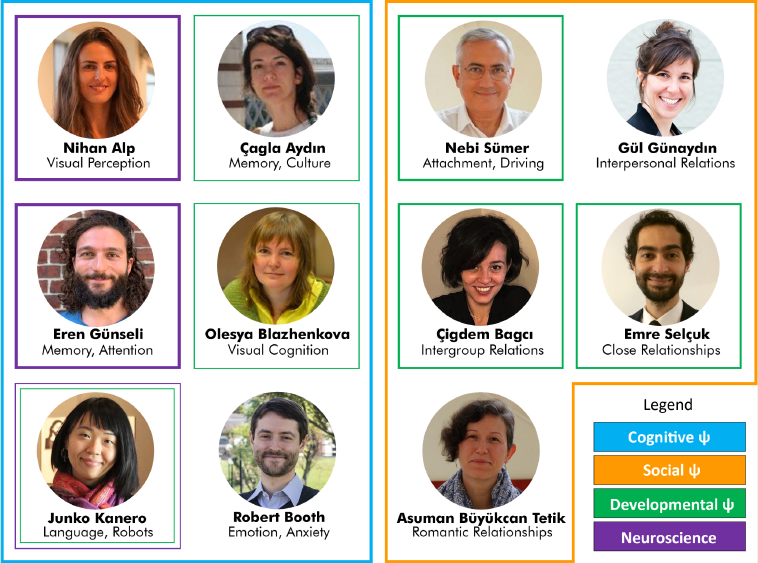Psychology
The Sabancı University Psychology Program brings together a vibrant group of researchers interested in understanding how people think, feel, and behave. Our graduate program has a strong emphasis on hands-on research experience. Students can take an active role in diverse research projects throughout their studies, as early as their first semester. Moreover, with our connections to other programs and faculties within the University, we offer great opportunities for interdisciplinary and applied research. Students who complete our graduate program will have gained extensive experience in communicating science, through writing scientific articles, and through presenting their research at seminars and conferences. Our goal is to provide a solid methodological and statistical background, develop critical thinking, and provide direct experience and practical skills for every stage of the research process. Our students will have the opportunity to use our state-of-the-art research facilities, including video-equipped observation laboratories, EEGs, online survey software, computer-based behavioral testing cubicles, eye trackers, large group testing spaces, facial electromyography equipment, and electrodermal activity equipment.
The Social Psychology Track focuses on interpersonal relationships and intergroup processes. Our students study and research parent-child relationships and language development in early life, formation, maintenance, and loss of adult social and intimate relationships, family dynamics, attachment, the interplay between memories and social relationships, self-regulation, culture, intergroup contact, prejudice and discrimination, and well-being. Our students can gain experience using multiple methods including experiments, naturalistic and laboratory behavioral observations, cross-sectional and longitudinal surveys, and daily experience assessments.
The Cognitive Psychology Track gives students a broad basis in the theories, methods, and applications of cognitive psychology and cognitive neuroscience. Students will study and work alongside experts working in the fields of memory, perceptual organization, attention, cognitive control, imagery, biological motion, language, affective cognition, experimental psychopathology, visual cognition and neuroscience, human-robot interaction, and road user behavior. Our courses strongly emphasize contemporary issues and trends in cognitive sciences. At the same time, our students receive a thorough grounding in experimental methodology and multivariate data analysis, and can gain expertise with psychophysiology, behavioral, observation and performance-based measures, surveys, eye tracking and EEG.
Psychology MS Program Objectives
- Characterize the nature of psychology in science and applied settings.
- Demonstrate psychological literacy and incorporate theoretical, statistical and experimental methods in scientific inquiry.
- Deepen comprehensive knowledge of psychology’s core foundation content domains, especially of cognitive, social, developmental psychology, and the biological bases of behavior.
- Formulate plausible psychological explanations for behavioral phenomena and develop scientific hypotheses.
- Produce innovative and integrative applications to solve problems.
- Behave and conduct research in accordance with the ethical standards of the discipline.
- Strengthen personal integrity and developing soft skills such as scientific writing and speaking, effective communication, teamwork, flexibility, and leadership.
- Exercise values that reflect a commitment to diversity and contribute to society.
- Apply psychological knowledge and scientific thinking, writing, and speaking skills in professional settings
- Develop advanced research designs and apply advanced statistical analyses.
Current Courses and Course Catalog
- Psychology Program Current Courses Graduate Course Catalog
- Graduate Course Catalog
Research Areas
- Attachment and Parenting
- Attention
- Biological Motion
- Cognition and Emotion
- Cognitive Control
- Cognitive Psychology/Neuroscience
- Experimental Psychopathology
- Group Processes and Intergroup Relations
- Human-Robot Interaction
- Interpersonal Relationships
- Language
- Memory
- Perceptual Organization
- Road User Behavior
- Self-regulation
- Social Cognition
- Visual Cognition
- Visual Imagery
- Visual Neuroscience
- Well-Being
Faculty Members

Application Requirements
- Official Transcript
- Statement of Purpose
- Research Plan
- Two Letters of Recommendation
- ALES, GRE or GAT scores
- English Proficiency Exam (TOEFL IBT, PTE Academic, CAE, CPE, YDS, e-YDS or YÖKDİL)
- CV
Graduate Scholarships
Scholarship evaluations for the candidates are made during the acceptance of their SU program. Graduate scholarship recipients are proposed by the Admission Jury based on students' academic history, then evaluated by the related Graduate School Administrative Board. Please click here for detailed information.
Contact
For further information about Graduate Program, please contact please contact
Junko Kanero